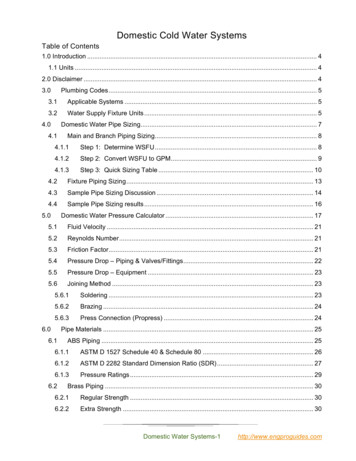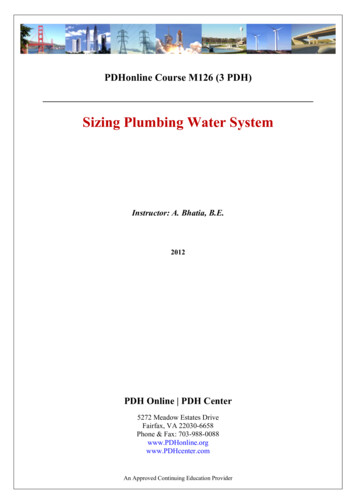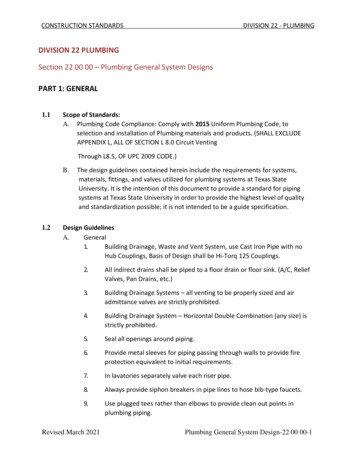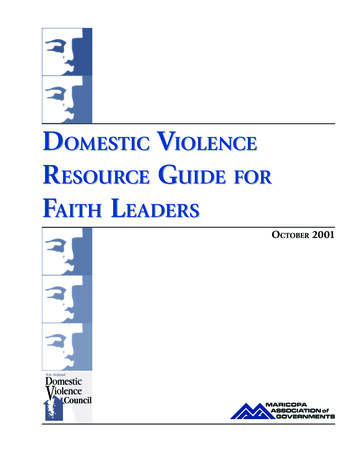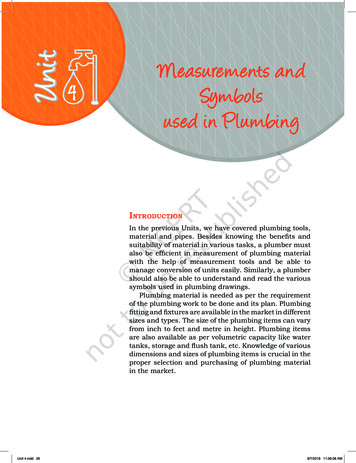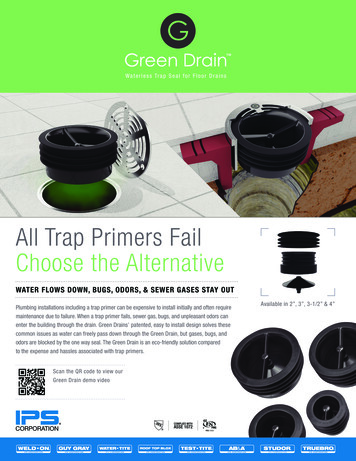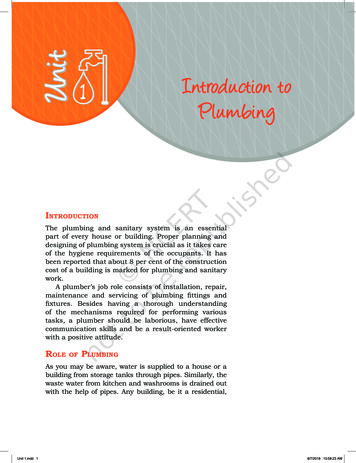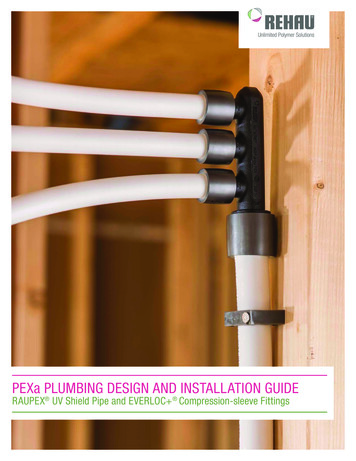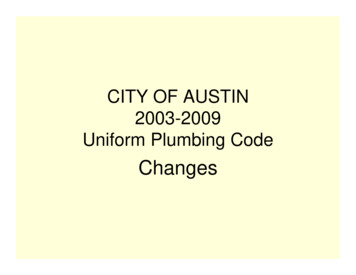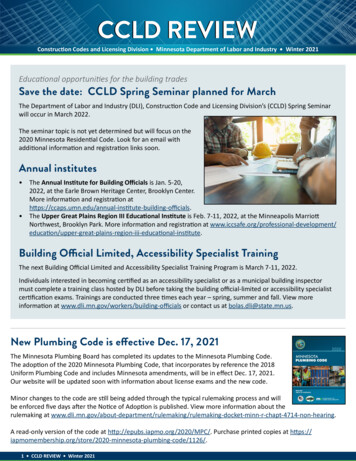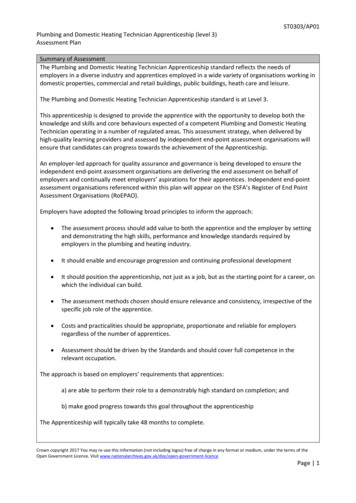
Transcription
ST0303/AP01Plumbing and Domestic Heating Technician Apprenticeship (level 3)Assessment PlanSummary of AssessmentThe Plumbing and Domestic Heating Technician Apprenticeship standard reflects the needs ofemployers in a diverse industry and apprentices employed in a wide variety of organisations working indomestic properties, commercial and retail buildings, public buildings, heath care and leisure.The Plumbing and Domestic Heating Technician Apprenticeship standard is at Level 3.This apprenticeship is designed to provide the apprentice with the opportunity to develop both theknowledge and skills and core behaviours expected of a competent Plumbing and Domestic HeatingTechnician operating in a number of regulated areas. This assessment strategy, when delivered byhigh-quality learning providers and assessed by independent end-point assessment organisations willensure that candidates can progress towards the achievement of the Apprenticeship.An employer-led approach for quality assurance and governance is being developed to ensure theindependent end-point assessment organisations are delivering the end assessment on behalf ofemployers and continually meet employers’ aspirations for their apprentices. Independent end-pointassessment organisations referenced within this plan will appear on the ESFA’s Register of End PointAssessment Organisations (RoEPAO).Employers have adopted the following broad principles to inform the approach: The assessment process should add value to both the apprentice and the employer by settingand demonstrating the high skills, performance and knowledge standards required byemployers in the plumbing and heating industry. It should enable and encourage progression and continuing professional development It should position the apprenticeship, not just as a job, but as the starting point for a career, onwhich the individual can build. The assessment methods chosen should ensure relevance and consistency, irrespective of thespecific job role of the apprentice. Costs and practicalities should be appropriate, proportionate and reliable for employersregardless of the number of apprentices. Assessment should be driven by the Standards and should cover full competence in therelevant occupation.The approach is based on employers’ requirements that apprentices:a) are able to perform their role to a demonstrably high standard on completion; andb) make good progress towards this goal throughout the apprenticeshipThe Apprenticeship will typically take 48 months to complete.Crown copyright 2017 You may re-use this information (not including logos) free of charge in any format or medium, under the terms of theOpen Government Licence. Visit cencePage 1
ST0303/AP01It is recommended that the core skills, knowledge and behaviours will be acquired by the apprentice inthe first 36 months with the specialist option undertaken and completed in the final year.It is recommended that Apprentices undertake a structured programme of study in suitableemployment and complete the on-programme training and assessment as part of a high-qualityprogramme. Apprentices can only attempt the separate, mandatory end point assessment once thepre-requisite gateway components have been achieved.The main objective of the end-point assessment is to provide a high quality cost effective means ofmeasuring apprentices' whole-job competence in the final stage of their apprenticeship.45 MonthsOn-programme knowledgeassessmentsLevel 3 Plumbing andDomestic HeatingQualificationOn-programme simulatedperformance assessmentsassessmentsOn-programme work basedperformance assessmentsassessmentsEnd-test GatewayCompletion of;Level 3 Plumbing and Domestic Heating QualificationLevel 2 MathsLevel 2 EnglishMultiple Choice TestFinal 3 MonthsDesign ProjectPlumbing andDomestic HeatingApprenticeship GradedEnd TestPractical Installation TestPractical Application TestProfessional DiscussionCrown copyright 2017 You may re-use this information (not including logos) free of charge in any format or medium, under the terms of theOpen Government Licence. Visit cencePage 2
ST0303/AP01Summary of AssessmentAssessment MethodMultiple choice testArea AssessedKnowledgeDesign projectKnowledgePractical installation testSkillsPractical Application testSkillsProfessional discussionKnowledge, Skillsand BehavioursAssessed ByIndependent end-pointassessment organisation inan independent assessmentcentreIndependent end-pointassessment organisation inan independent assessmentcentreIndependent end-pointassessment organisation inan independent assessmentcentreIndependent end-pointassessment organisation inan independent assessmentcentreIndependent end-pointassessment organisation inan independent ssional QualificationsLevel 3 Plumbing and Domestic Heating QualificationOn-Program AssessmentCompletion of Level 3 Plumbing and Domestic Heating Qualification,An Employer Occupational Brief has been developed, to provide additional advice and guidance aroundthe development of the EPA assessment and the on-programme qualification. The employersoccupational brief is freely available for download from www.aphc.co.uk/apprenticeshipsAssessment GatewayCompletion of the following will provide access to the End Point Assessment, once agreed by employerand training organisation: Level 3 Plumbing and Domestic Heating Qualification Level 2 Maths Level 2 EnglishCrown copyright 2017 You may re-use this information (not including logos) free of charge in any format or medium, under the terms of theOpen Government Licence. Visit cencePage 3
ST0303/AP01End Point AssessmentWhat is being assessed?The following areas will be assessed within the end-point assessment.Health and safety systemsLegislation, codes of practice, relevant regulations, safe working practices, risk assessment, COSHH andmethod statements, safe working environments and situations (working at heights, excavations etc.),fire protection and emergency procedures.Plumbing and Heating Science, processesScientific principles, heat transfer, units of measurement, mechanical principles, electrical principles,plumbing and heating design principles. Pipework measuring, cutting, bending and jointing techniques.Allied trade skills, plastering, drilling, cutting and making good different building fabrics.Environmental and energy efficient working practicesEnvironmental principles - Compliance to environmental legislation and the impact of processes andtechnologies associated with fire, emergency and security systems. Questions to assess the apprenticeon the culture of re-use and recycle, WEEE Regulations (Waste electrical electronic equipment).Meet work and project plans and meeting customer expectationsManaging time, resource and job planning for economy, business and client convenience and soundbusiness principles. Principles of high quality customer service and the needs of others. Building andmaintaining relationships. Communicating in a clear, articulate and appropriate manner.Plumbing and Heating SystemsSize, select, plan, install, test, commission, decommission, service, maintain, fault find and repairplumbing and heating systems, including; cold water, hot water, central heating, sanitation andrainwater, electrical and heating controls, fuel burning appliances and environmental technologies.The details of what will be assessed by each method is set out in Appendix 1.How is it being assessed?The knowledge element of the end point assessment has two components: Multiple Choice Test andDesign project.Multiple Choice Test (Underpinning Knowledge Assessment) – a global assessment made of 50questions, multiple-choice, each with one correct answer and three distractors, centrally set andcentrally marked. The knowledge areas will be selected from an assessment bank that covers the fullknowledge range, as specified in appendix 2 of this Assessment Plan. This examination will have amaximum time of 90 minutes.Crown copyright 2017 You may re-use this information (not including logos) free of charge in any format or medium, under the terms of theOpen Government Licence. Visit cencePage 4
ST0303/AP01Design Project (Applied Knowledge Assessment) – taking 7 hours’ duration, in an assessment centre.Building plans are provided to the apprentice with a job specification, manufacturer’s information anddata, British Standards and regulations. The apprentice is asked to complete a heating, hot water andcold water design capable of meeting the job specification. The apprentice will then produce: Design criteria Completed fabric heat loss Heating pipework sizing Hot and cold water sizing Final layout plans Materials list Merchant orderThe performance element has two components: the Practical Installation Test and the PracticalApplication Test.Practical Installation Test (Underpinning Skills Assessment) – will see Apprentices complete thefabrication of a pipework frame, utilising different materials and pipework components with variousjointing techniques. The assessment marking criteria will include overall performance and soundness,quality of manufacture and tolerances of 2mm. This assessment should be completed within 6 hours.Practical Application Test (Applied Skills Assessment) – will be carried out in an assessment centrewithin a secure bay. The apprentice will inspect a pre-installed unvented cylinder, functioning withelectrical components and controls. The assessor will make alterations to the system to create faultson various components within the system. The apprentice is then given 2 hours to identify the faultsand repair then re-commission the system. Finally, the apprentice will complete a service on theunvented system, according to manufacturer’s instructions, this will be undertaken within 1 hour.Optional Pathways and Behaviours – will be assessed through the Professional Discussion andsupported by the production of a work place log book completed by the apprentice during the endpoint assessment period, with at least 8 weeks to complete, after the gateway.The log book must be designed and developed by EPAOs so that it aligns with the knowledge and skillsof the core options along with the behaviours specified within Appendix 1 - Assessment MethodIdentification. The EPAOs must provide advice and guidance on what constitutes best practice in thecompilation of the log book, including the quality of entries and examples of evidence that could beprovided etc.Apprentices will be responsible for the full and varied compilation of evidence that will be required forsubmission purposes. The log book should record the apprentice’s achievements as they progressthrough the EPA period and should be supplemented with employer testimonies, performanceappraisals and timely endorsements of competence from line managers.The apprentice’s log book entries should be typographically correct; errors will impact on award ofgrade. In addition, evidence contained must be sufficient, authentic and relevant.On completion, the apprentices finished log book will be sent to the End Point Assessor at least 2weeks in advance to prepare for the professional discussion. The appointed independent assessor willreview the log book and the professional discussion (which will take 30 minutes) will be used to verifyand question the apprentice in relation to the log book.Crown copyright 2017 You may re-use this information (not including logos) free of charge in any format or medium, under the terms of theOpen Government Licence. Visit cencePage 5
ST0303/AP01Who will carry out the assessment?End-point assessments will be carried out by staff from independent end-point assessmentorganisations on the ESFA’s Register of End-Point Assessment Organisations (RoEPAO).To ensure consistent and reliable judgements are made, independent end-point assessors will besubject to rigorous quality assurance and must take part in regular standardisation activities. Themandatory criteria for independent end-point assessors is set out below.Occupational expertise of plumbing and domestic heating independent end-point assessorsThe requirements set out below relate to all plumbing and domestic heating independent end-pointassessors. Independent end-point assessors must: Have excellent knowledge and understanding of the apprenticeship standard as set out inthe industry set Grading Criteria. Hold a recognised workplace assessment qualification, for example an NVQ Level 3 inPlumbing and Domestic Heating. The list of approved qualifications will be published atwww.aphc.co.uk/apprenticeship and updated as new, appropriate qualifications arereleased. Relevant occupational expertise and knowledge, at the relevant level of the occupationalarea(s) they are assessing, which has been gained through ‘hands on’ experience in thePlumbing and Domestic Heating industry. Practice standardised assessment principles set out by the end-point assessmentorganisation and hold a recognised assessing qualification such as an A1. Have sufficient resources to carry out the role of independent end-point assessor i.e. timeand budget. Continuous professional development for plumbing and domestic heating independentend-point assessorsIt is necessary for independent end-point assessors to maintain a record of evidence of theircontinuous professional development (CPD). This is necessary to ensure currency of skills andunderstanding of the occupational area(s) being assessed, and can be achieved in a variety of ways. Itshould be a planned process, reviewed on an annual basis, for example as part of an individual’sperformance review.Independent assessors should select CPD methods that are appropriate to meeting their developmentneeds. Within a twelve-month period, an independent end-point assessor will be required todemonstrate they have gained practical experience in the plumbing and domestic heating industrywhich develops/up-dates their knowledge/skills. The following provides an example of a variety ofmethods that can be utilised for CPD purposes, a multiple of which need to beexperienced/undertaken.Updating occupational expertise (at least 10 hours per year): Internal and external work placements to gain ‘hands on’ experience Work experience and shadowing External visits to other organisations Updated and new training and qualifications Training sessions to update skills, techniques and methodsCrown copyright 2017 You may re-use this information (not including logos) free of charge in any format or medium, under the terms of theOpen Government Licence. Visit cencePage 6
ST0303/AP01Keeping up to date with sector developments and new legislation (at least 5 hours per year): Relevant sector websites and twitter feeds Membership of professional bodies and trade associations Papers and documents on legislative change Seminars, conferences, workshops, membership of committees/working parties Staff development daysStandardising and best practice in assessment (at least 5 hours per year): Quarterly standardisation meetings with colleagues (see requirements for standardisationbelow) Sharing best practice through internal meetings, news-letters, email circulars, social media Comparison of assessment and verification in other sectorsEnd Point Final JudgmentFinal judgement and marking will be made by the independent assessor, approved through the endpoint assessment organisation and meeting the assessor competence requirements laid out within thisassessment plan.IndependenceIndependence and impartiality are achieved through the end-point assessment being undertaken by anindependent end-point assessor.The independent end-point assessor will assess each apprentice’s work, including the grade to beawarded, based on evidence produced through the end point assessment methods.Organisations delivering the independent assessor service, in addition to appearing on the ESFA’sRoEPAO and acting on behalf of the industry, will be responsible for management and independentmoderation of these services.Summary of Roles and ResponsibilitiesEmployerThe employer will support the apprentice throughout their training andconduct regular reviews to monitor their progress throughout theirapprenticeship. The employer will determine when the apprentice isready to be put forward to the end point assessment. The employer maytake advice from the training provider, if appropriate.ApprenticeThe apprentice will receive regular reviews with their employer givingregular opportunities to raise any training needs or issues. Theapprentice will self-reflect if they are ready to proceed to the end-pointassessment.Training ProviderThe training provider as appropriate will jointly provide support to theemployer in the training of the apprentice throughout theirapprenticeship (on-program), developing the tools required for theapprentice to acquire the skills, knowledge and behaviour for fulloccupational competency through the end-point assessment.Crown copyright 2017 You may re-use this information (not including logos) free of charge in any format or medium, under the terms of theOpen Government Licence. Visit cencePage 7
Independent End-PointAssessment OrganisationST0303/AP01The Independent End-Point Assessment Organisation will administer thedelivery of the end point assessment test and is solely responsible fordetermining the overall competence of the apprentice.Quality Assurance - InternalThe key to success with any training and qualification programme lies in ensuring that the requiredstandards are met consistently and reliably. This can only be achieved through a rigorous qualityassurance regime.For the Plumbing and Domestic Heating Technician Apprenticeship, the End-Point AssessmentOrganisations will be required to meet the following requirements:Assessment organisations are registered on the ESFA Register of apprenticeship assessmentorganisations. Assessment organisations are responsible for ensuring assessments are conducted fairlyand that assessments are valid, reliable and consistent. It is essential that assessment organisations: Ensure independent end-point assessors are competent both occupationally and inassessment practicesEnsure assessments are planned, communicated and executed fairlyQuality assurance of independent end assessments with planned internal quality assuranceactivity, including both desk based and ‘live’ quality assurance activity.(This must be performed on a risk basis, i.e. new or poorly performing assessors must haveevery element of every assessment quality assured, but established, high performingassessors can be quality assured on a sampling basis, with at least one assessment activitybeing subject to either desk based or live internal quality assurance activity on an annualbasis)Ensure on-demand tests are correctly invigilated.Ensure standardisation of all assessors, including but not limited to: Review of annual adherence to CPD requirementsStandardisation meetings – at least quarterly but required frequency to depend on internaland external quality assurance outcomes of each assessment organisationAssessment and verification training sessionsShadowing and cross checking of other assessorsAddress poor performance from assessors to ensure high standards of end assessmentObtain and review feedback / satisfaction results from apprentices and employers, takingappropriate actions for improvementAddress and administer any appeals and grievances fairly and in line with the consistentapproachEnd-Point Assessment Organisations will be required to operate in accordance with a qualitymanagement system, including an internal audit regime, which assures compliance with therequirements outlined above.Crown copyright 2017 You may re-use this information (not including logos) free of charge in any format or medium, under the terms of theOpen Government Licence. Visit cencePage 8
ST0303/AP01Quality Assurance – ExternalExternal quality assurance (EQA)End-point assessment organisations will be subject to external quality assurance to deliver nationalconsistency across the plumbing and domestic heating industry which is overseen by the Plumbing andDomestic Heating Apprenticeship Board.External quality assurance (EQA) of the end point assessment for plumbing and domestic heatingapprenticeship standardsAll assessment organisations listed on the Register of End-Point Assessment Organisations (RoEPAO)must follow the external quality assurance process in this plan. The external quality assurance will beoverseen by a Plumbing and Domestic Heating Apprenticeship Board and conducted and managed byAssociation of Plumbing and Heating Contractors (APHC) on a non-profit making basis and independentof commercial or other financial gain. Supporting information on the external quality assurance can befound at www.aphc.co.uk/apprenticeshipPlumbing and Domestic Heating Apprenticeship BoardThe board should be reflective of the type of work carried out across the industry to include new-buildinstallation, retro-fit and refurbishment along with service and maintenance activities. The board willalso reflect business size within the industry to include small, medium and large employers.Membership of the board is not subject to membership of any other industry organisation, includingAssociation of Plumbing and Heating Contractors (APHC) and Chartered Institute of Plumbing andHeating Engineers (CIPHE). When a vacancy arises, Plumbing and Domestic Heating employers areinvited to apply for a seat on the board. Each vacancy will be advertised in the plumbing and domesticheating trade press to ensure independence of selection.Applications will be considered, and selection will be based on a desk based review and potentialinterview, against a person and business specification, covering size of business, scope of businessactivities, employer’s experience, knowledge, qualifications and commitment to ensuring thatapprentices consistently achieve the apprenticeship standard.The industry trade association (APHC) and professional institute (CIPHE) are committed to workingtogether to carry out the selection process in a transparent and neutral manner, giving joint supportfor the successful applicant. Where a nominee does not immediately secure a place on the board, theywill be retained on a list of prospective members for future vacancies.APHC, CIPHE and Plumbing and Heating Skills Partnership (PHSP) will each have one non-voting seat onthe board.A Board of six employers: Represent the views of their business and industry networksAre subject to re-election after a period of 2 years (requiring the support of twoorganisations).Crown copyright 2017 You may re-use this information (not including logos) free of charge in any format or medium, under the terms of theOpen Government Licence. Visit cencePage 9
ST0303/AP01Re-election is not automatic to give opportunities for other employers to be part of theboardWork openly, challenge, innovate and drive the industry’s apprenticeship commitment toqualityContribute their specific experience and expertiseActively communicate and engage other employers and partners to achieve high qualityapprenticeshipsIn relation to quality the responsibilities of the Board include: A full knowledge and understanding of the:o content of the assessment plano external quality assurance arrangements and methodologyo infrastructure and processes used to manage and operate the external qualityassuranceAgreeing measures to benchmark external quality assurance results set by APHCOverseeing external quality assurance results based on the provision of quarterly reportsprovided by APHC and agreeing corrective action as necessaryWorking collaboratively with assessment organisations, to identify and address mattersrelating to the external quality assurance process and resultsReviewing evaluation results to ensure that the Plumbing and Domestic Heatingapprenticeship remains fit for purpose and advising on matters of maintenance which mayimpact on external quality assuranceReviewing and addressing complaints against Plumbing and Domestic Heatingapprenticeship and external quality assurance resultsPlumbing and Domestic Heating Apprenticeship Industry GroupThe Industry Group will provide advice and guidance to the board, on matters concerning the deliveryof the apprenticeship end point assessment. The Plumbing and Domestic Heating ApprenticeshipIndustry Group are not a decision-making group and all matters are referred to the board for finalratification and agreement.The group is made up from representatives of Industry Stakeholders, through a transparent selectionprocess, to include: Training Provider (1) (representative)Managing Agent (1) (representative)College (2)Assessing Organisations (3) (representative)Awarding Organisations (3) (representative)National Association of Plumbing Teachers (NAPT) (1)Plumbing and Domestic Heating Board (1)APHC (1)CIPHE (1)Membership to the Industry Group for the two years and is not subject to membership of any otherindustry organisation. When a vacancy arises within the representative groups, organisations operatingwithin that representative grouping are invited to apply for a seat on the industry group. Each vacancywill be advertised in the plumbing and domestic heating trade press to ensure independence ofselection.Crown copyright 2017 You may re-use this information (not including logos) free of charge in any format or medium, under the terms of theOpen Government Licence. Visit cencePage 10
ST0303/AP01Applications will be considered, and selection will be based on a desk based review and potentialinterview, against a business specification, covering scope of business activities and commitment toensuring that apprentices consistently achieve the apprenticeship standard.The industry trade association (APHC) and professional institute (CIPHE) are committed to workingtogether to carry out the selection process in a transparent and neutral manner, giving joint supportfor the successful applicant. Where a nominee does not immediately secure a place on the board, theywill be retained on a list of prospective members for future vacancies.APHC and CIPHE will each have one non-voting seat on the board.The Industry Group members: Represent the views of their business and industry networks Work openly, challenge, innovate and drive the industry’s apprenticeship commitment toquality Contribute their specific experience and expertise Provide support and guidance to the Apprenticeship BoardProcess for initiating external quality assuranceIn order to start the external quality assurance process, the assessment organisation will notify APHConline at www.aphc.co.uk/apprenticeshipExternal quality assurance visits will be completed, at least annually, on each assessment organisation,and may include more than one visit/activity where an assessment organisation operates in more thanone region, or uses multiple assessment centres, each centre receiving a visit at least bi-annually.External quality assurance will comprise a range of activities, examples of which are detailed below andwill include on-site visits to assessment organisations.External quality assurance activitiesExternal quality assurance will focus on four defined areas to ensure compliance, including: consistencyof assessment materials, competence and performance of staff, the internal quality assurance checksand the overall planning and reporting of the apprenticeship end point assessment process.Ensuring consistency of assessment materials Design of the assessment materials Consistent application and internal quality assurance of assessment materials during endpoint assessmentsCompetence of staff – EQA activity will check Vocational competence of assessment and internal verification staff That assessment and internal quality assurance staff have been trained on end pointassessment for the plumbing and domestic heating standard That Continuous Professional Development of both vocational and assessmentcompetence is occurring to the prescribed standardInternal quality assurance – EQA activity will checkCrown copyright 2017 You may re-use this information (not including logos) free of charge in any format or medium, under the terms of theOpen Government Licence. Visit cencePage 11
ST0303/AP01 Independent assessment organisations have implemented internal quality assuranceprocedures as set out in the assessment planReporting and management of information – EQA activity will check Timely and accurate registration of the apprentice and notification of results Accuracy of internal data against registrations in the APHC Management system Full, accurate and legible recordsSampling size and frequencyAn assessment organisation’s sample size will vary due to many considerations. Each assessment‘centre’ (i.e. if an assessment organisation provides remote centres or operates multiple teams ofassessors) will be sampled bi-annually.The baseline sample for the first external quality assurance visit will be 10%. At the end of each EQAvisit the assessment organisation’s performance will be graded (e.g. excellent, adequate, poor) andfuture EQA activity levels will be planned accordingly.Assessment organisations receiving excellent EQA results can expect future samples to be less than10% and assessment organi
Plumbing and Heating Science, processes Scientific principles, heat transfer, units of measurement, mechanical principles, electrical principles, plumbing and heating design principles. Pipework measuring, cutting, bending and jointing techniques. Allied trade skills, plastering, drilling, cutting and making good different building fabrics.
